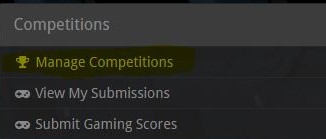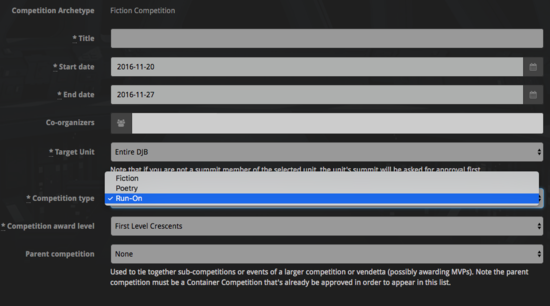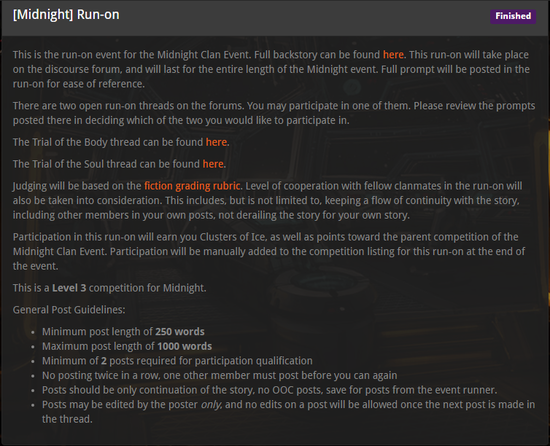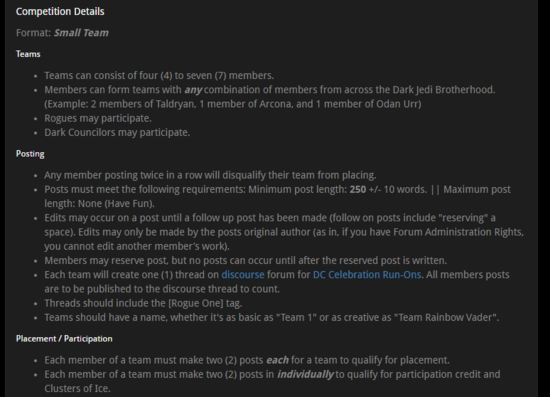A Run-On is a series of posts taking place on the Forums where multiple members further a central plot by taking turns. Each member details a piece of the story, usually from their own character's perspective, though they may write about another member's character within the scope of the previously written material.
Run-Ons are a major part of activity, especially for those members who focus on writing within the Brotherhood.
The following article will look to outline how Run-Ons work in the Dark Jedi Brotherhood by covering how they are run, organized, and graded. It is a resource created to educate and learn more about how Run-Ons work, and is not by any means a primer on writing techniques used in narrative storytelling.
What are Run-Ons?
Run-Ons are a type of fictional activity in the Dark Jedi Brotherhood that bring together multiple writers in order to tell a larger-scale narrative. Each writer contributes to the overarching plot by writing and then “posting” individual segments that play off and continue the other writers' segments to craft a Run-On story.
Run-Ons require the use of communication, and are often the most collaborative form of writing that members are able to take part in. This article will look to outline and describe how Run-Ons are set up, organized, and graded while providing a reference guide for both beginners and seasoned Run-On writers.
Types of Run-Ons
There are four types of Run-Ons that can be organized as fictional activity in the Dark Jedi Brotherhood.
Small Team Run-On
Small Team Run-Ons have become the standard format for Run-On competitions in the Dark Jedi Brotherhood. The focus of a Small Team Run-On is for members to tell a collaborative story that reads as a single, complete narrative while maintaining continuity with each other's posts. These Small Teams do not need to be continuous with other teams that are competing. Team sizes are flexible, as is the types of members that can make up the composition of these teams. Both the team size and composition details should be determined during the organization and setup of the competition.
Unit vs Unit Run-On
In a Unit vs Unit Run-On — typically seen in past/older Great Jedi Wars — each unit participates as a team against the other Units (Clans) of the Brotherhood for placement. The focus of a Unit Run-On is to tell a collaborative story with contributions from each participating member while maintaining continuity with each other's posts.
Unit Run-On
A Unit Run-On — typically run at either the Clan, House, or Battleteam Level — is a self contained story in which members of the same unit take turns posting to create a collaborative story with contributions from each participating member while maintaining continuity with each other's posts.
Personal Run-Ons
Personal Run-Ons can be organized among various members for personal writing purposes, including (but not limited to) character development, side plots, etc. Members are able to take advantage of the Discourse forums to host personal Run-Ons with friends and clanmates. These can be used for character development, exploration, alternate universe stories, or just for fun. Personal Run-On word counts can be used for Journeyman promotions, but do not qualify for Clusters of Ice.
Creating a Run-On Competition
It is important to work with your Clan and/or House Summit when submitting competitions for approval. A member of the Voice Staff will either approve or remand your competitions. If remanded, they will detail notes on why. While the MAA has the final sign off, Run-On competitions are approved by the Voice Staff and follow the Voice Competition Approval Guidelines. This would be a good document to start reading that details what is required to create a competition.
Administration
Run-On competitions can be created from your user Administration panel. You can do this by navigating to:
Manage Competitions -> Create Competition -> Create “Fiction Competition”,
 Selecting a fiction competition.
Selecting a fiction competition.
This will bring you to the competition creation screen, where you can then fill in the necessary information and details you’ve learned about in this exam.
 Selecting a Run-On type under a Fiction Competition.
Selecting a Run-On type under a Fiction Competition.
Title
The title of your Run-On should tie into the theme of your prompt/event. Run-Ons, based on their collaborative nature, tend to be easier to remember than most writing based events. For example, it might be easier for members to recall memories from “The Precipice of Defeat” Run-On than “Sable-Dark Run-On #2”.
Start/End Date
Run-Ons need more time to develop and bloom than a standard fiction event. The suggested time-frame that has been successful and that is recommended currently is 1-2 months.
For Brotherhood wide events or vendettas, a typical Run-On duration is one month (30 days). For more story-focused Run-Ons outside of major competitions, 2-3 months is the recommended time table.
Co-Organizers
Run-Ons can have multiple organizers, but the organizers that will be doing the actual grading should be announced in the Grading Details.
Competition Type
Selecting Run-On as a competition type will submit the competition to the Voice staff for approval as it will reward Clusters of Ice, which work towards your Inquisitorius rank as well as other activity metrics.
As outlined on the Cluster of Ice:
For Run-on type competitions, Clusters of Ice are awarded at the same one (1) Cluster of Ice per 500 words of fiction for a valid entry upon completion of the competition, with a cap on the number of words that will be awarded at 500 words for each post a member makes. All excess words beyond this cap will go unrewarded, while insufficient words unable to meet 500 per post will result in less than one (1) Cluster of Ice per post. There is no maximum number of posts allowed in a Run-On, subjective to the specific requirements of the competition itself to be a valid entry, resulting in no maximum number of Clusters of Ice that can be awarded in a Run-On fiction event.
Competition Award Level
Below is a quick summary of the Crescents awarded for certain RO levels:
Public Competition Details
This is where the details, prompt, rules, and guidelines should be made transparently clear and outlined for participants. This should include:
- Type of Run-On
- Rules/Guidelines
- Prompt(s)
- Judges/Grading
Crucially, this should also include a link to the Run-On forum where members should post their responses. Information on how to use the Run-On forum can be found below.
Using the Discussion Forums (Discourse)
Run-On forums should be created in the Run-Ons sub-forum of the Discussion Forums, otherwise known as Discourse. To create a post in this section, first login to the Brotherhood discourse using your standard Dark Jedi Brotherhood login credentials. Then click ‘New Topic’ in the top right hand corner of the site. This will bring up the following screen:
File:ROStudies2.pngUsing Discourse to begin a Run-On.
It is standard practice for the competition organiser to create the topic using the instructions and rules for the Run-On, including any relevant information (such a locations, dates, and any generic information about grading, for example). The competition organiser will then post the first post of the Run-On in reply to their introductory post to which participants will reply with their follow on Run-On posts.
Rules and Guidelines
Run-On competitions have a standard set of rules and guidelines.
Word Counts and Caps
It’s important to define the minimum and maximum word count a participant must meet when publishing each post in a Run-On. This is tied to the individual posts and not the overall total length of the Run-On. Failure to adhere to the outlined minimum and maximum word count will result in individual disqualification.
For Small-Team Run-Ons, failure to meet the minimum or maximum word cap may result in preventing the rest of a participant's team from qualifying for placement in a competition. In these instances, individuals are still able to earn participation credit even if a member of their team is disqualified.
These rules all have some flexibility based on the competition organizer. However, the recommended standard and default is as follows:
- Minimum word count: 250 words.
- Maximum word count: None.
Posting and Editing
This section is critical to understanding the intricacies of a Run-On..
It’s important to define the minimum and maximum post count a participant must meet in a Run-On. Double posting is not allowed in a Run-On. This means that after you post, you cannot follow up that post with another one of your own. Run-Ons are all about collaborative storytelling with other members, so double posting is an easy way to ruin the back and forth flow with the rest of your team. It is equally as important to outline that participants may not edit a post after another post has come after it in the Run-On thread. Failure to meet these Posting and Editing rules will result in individual disqualification from the competition.
For Small-Team Run-Ons, failure to meet the minimum or maximum post count may result in preventing the rest of a participant's team from qualifying for placement in a competition. In these instances, individuals are still able to earn participation credit even if a member of their team is disqualified.
These rules all have some flexibility based on the competition organizer. However, the recommended standard and default is as follows:
- Minimum post count for individual qualification: 2 posts
- Minimum post count for team qualification: 2 posts/per team member.
- There is no maximum post count.
- Participants may not double-post.
- Participants may not edit a post after another team member has subsequently posted.
Team Size and Composition (Small Team only)
When running a Small Team Run-on, make sure to outline any outstanding criteria. Team Size must be more than 2 members and has no limit. Teams can be composed of any combination of members from across the Brotherhood unless specified otherwise by the competition organizer. Teams can be formed by member selection, or by assignment. If assigning teams, it is important to make sure that you are transparent with how teams will be assigned.
These rules all have some flexibility based on the competition organizer. However, the recommended standard and default is as follows:
- 2-7 members per team.
- Members can form teams from any combination of members across the Brotherhood (e.g. two Jedi and a Sith, two Taldryanites and an Arconan).
Example: Unit Run-On
Below is an example of how to display competition details for a Small Team Run-On. The Competition administration pages utilize Markdown.
 The shiny example.
The shiny example.
Example: Small Team Run-On
Below is an example of how to display competition details for a Small Team Run-On. The Competition administration pages utilize Markdown.
 The second shiny example.
The second shiny example.
Grading
Official Run-Ons are graded using the Run-On Rubric found here.
The Run-On Grading Rubric is different from the Fiction and ACC rubrics in that it puts weight on presentation over strict syntax. This includes focusing on transitions between scenes and character point-of-views, which are an important part of the collaborative storytelling taking place within a Run-On.
The four criteria are:
- Presentation (mostly syntax, mechanics, and formatting)
- Continuity (consistency and flow between multiple writers)
- Realism (use of Character Sheets, Star Wars, and DB lore appropriately)
- Story (plot, story, literary techniques, etc.)
Whether using the official rubric or not, the criteria that will be used for grading must be clearly outlined for the participants.
When using the Run-On Grading Rubric, you can create your own score sheet cards by using this Google Sheet template. To use the template, make sure to go to “File” -> “Make A Copy.” Also take a look at this Template Example.
Be sure to leave notes in the “Notes” section so participants can understand how you came about deciding your final decision. Offering tips on where to improve are also helpful, as well as likes/dislikes. Just make sure to always be constructive, because that’s the only way people learn and grow from feedback.
Summary
When creating a Run-On competition, communication is very important. If your members are confused with what they are supposed to do, it will be harder for them to compete and enjoy the activity you are trying to run for them. To prevent this from happening, a good Run-On competition write-up should always include the following details:
- The Type of Run-On.
- Transparent Rules and Guidelines.
- Clear Prompt(s).
- Clear Judges/Grading.